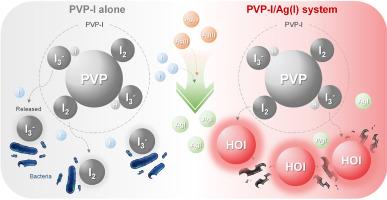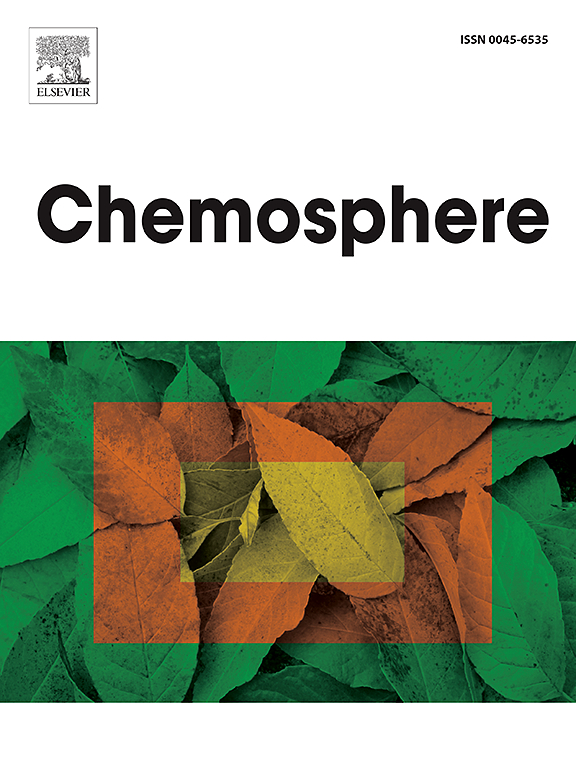聚维酮碘在银离子存在下的杀菌效果增强。
IF 8.1
2区 环境科学与生态学
Q1 ENVIRONMENTAL SCIENCES
引用次数: 0
摘要
随着全球抗生素耐药性感染率的上升,有必要开发创新的抗菌系统,以有效控制病原体。本研究探讨了聚维酮碘 (PVP-I) 和银离子 (Ag(I)) 组合系统的协同杀菌效果。PVP-I/Ag(I) 系统对四种关键的代用细菌表现出更强的杀菌活性:两种革兰氏阴性细菌,即大肠杆菌(E. coli)和铜绿假单胞菌(P. aeruginosa),以及两种革兰氏阳性细菌,即金黄色葡萄球菌(S. aureus)和枯草杆菌(B. subtilis)。我们的实验发现,Ag(I)与碘离子(I-)相互作用形成碘化银(AgI)。这种反应通过改变从 PVP-I 中释放的 RIS 的平衡,促进了次碘酸(HOI)的形成,次碘酸是一种比其他活性碘物种(RIS)更强的杀菌剂。在代表性条件下([PVP-I]0 = 1 mg/L,[Ag(I)]0 = 5 μM,pH = 7.3),PVP-I/Ag(I)体系中的 HOI 浓度是单独 PVP-I 体系中的 2.4-3.9 倍,与理论预测一致。PVP-I/Ag(I) 系统的杀菌效果受 pH 值变化的影响,影响 HOI 的形成。该系统是一种很有前途的工具,可用于快速有效地控制微生物,从而提高公共卫生成果。本文章由计算机程序翻译,如有差异,请以英文原文为准。

Enhanced bactericidal effects of povidone-iodine in the presence of silver ions
The rising prevalence of antibiotic-resistant infections worldwide necessitates the development of innovative antimicrobial systems for effective pathogen control. This study investigates the synergistic bactericidal effects of a combined system comprising povidone-iodine (PVP–I) and silver ions (Ag(I)). The PVP-I/Ag(I) system exhibited enhanced bactericidal activity against four key surrogate bacterial species: two Gram-negative bacteria, Escherichia coli (E. coli) and Pseudomonas aeruginosa (P. aeruginosa), and two Gram-positive bacteria, Staphylococcus aureus (S. aureus) and Bacillus subtilis (B. subtilis). Our experiments revealed that Ag(I) interacts with iodide ions (I−) to form silver iodide (AgI). This reaction promotes the formation of hypoiodous acid (HOI), a more potent bactericidal agent than other reactive iodine species (RIS), by shifting the equilibrium of RIS released from PVP-I. Under representative conditions ([PVP-I]0 = 1 mg/L, [Ag(I)]0 = 5 μM, pH = 7.3), the concentration of HOI in the PVP-I/Ag(I) system was 2.4–3.9 times higher than in the PVP-I system alone, aligning with theoretical predictions. The bactericidal efficacy of the PVP-I/Ag(I) system was influenced by pH variations, affecting HOI formation. This system represents a promising tool for rapid and effective microbial control, potentially enhancing public health outcomes.
求助全文
通过发布文献求助,成功后即可免费获取论文全文。
去求助
来源期刊

Chemosphere
环境科学-环境科学
CiteScore
15.80
自引率
8.00%
发文量
4975
审稿时长
3.4 months
期刊介绍:
Chemosphere, being an international multidisciplinary journal, is dedicated to publishing original communications and review articles on chemicals in the environment. The scope covers a wide range of topics, including the identification, quantification, behavior, fate, toxicology, treatment, and remediation of chemicals in the bio-, hydro-, litho-, and atmosphere, ensuring the broad dissemination of research in this field.
 求助内容:
求助内容: 应助结果提醒方式:
应助结果提醒方式:


